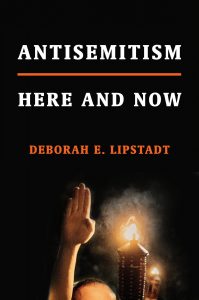Australia/Israel Review
Biblio File: A History of the Present
Apr 3, 2019 | Jeremy Jones

 Antisemitism, Here and Now
Antisemitism, Here and Now
Deborah Lipstadt
Scribe, Melbourne, 2019, 304 pp., A$32.99
Shortly after the fall of the Soviet Union, a wave of optimism was sweeping Europe and infecting many other parts of the globe.
Not only had the possibility arrived for a new era of freedom for individuals and nations who had been within the direct Soviet sphere, but there was a belief that proxy wars would come to a conclusion and a new global political environment would come into being.
In Jewish circles, there was a celebration of new potential for Jewish people who wanted to either live as Jews in Russia and the other Soviet Republics or to leave them.
Additionally, there was a widespread view that the demise of a State which not only persecuted its Jewish citizens but spread defamation of Jews through agencies such as the United Nations and a variety of “anti imperialist” organisations and movements would bring an end to a history of hateful discourse.
At one particularly memorable conference in Brussels, speaker after speaker seemed intoxicated with a view that, after thousands of years, Jewish people would now be treated no differently to others and antisemitism would soon be a subject for study by historians rather than political scientists, sociologists or psychologists.
Fast forward to 2019 and a world in which Jews in many countries feel harassed, intimidated, threatened or, at best, insecure.
In countries which have had long traditions of antisemitism and short periods of neutrality or even philosemitism, old attitudes are returning to the fore.
In societies which never seemed to find a problem with their own antisemitism, the most anti-Jewish voices seem to be growing ever louder.
In the few places where antisemitism has been a minor factor and in which, particularly in the recent past, Jewish people have felt generally secure and comfortable, concerns regarding language and actions have developed in a significant way.
In good times and bad, there have been individuals and organisations which have done their best to understand the various phenomena which together comprise antisemitism – with an aim to using this knowledge to defend Jews and to inoculate the wide society against ideas which have always proven destructive.
It has never been a simple task, for a number of reasons.
Antisemitism has taken many forms and revealed itself in many ways.
Some antisemitism belongs in the category of “dislike of the unlike”, and is equated to racism towards any minority or foreign population.
A variant of this is the antisemitism directed at specific, small minorities, who have proved resilient and, in certain circumstances, successful – resulting in both jealousy and contempt.
An extension of this variant uses conspiracy theories to rationalise the apparent flourishing of the despised and to justify actions against this minority. When it comes to Jews, the antisemitic historiography reinforces the malicious and challenges the rational.
Not unrelated, but quite distinct, have been attitudes towards Jews shaped by post-Jewish Abrahamic religions.
The fact that Judaism did not end when Jews were given the opportunity to join the Christian, then later the Muslim, faith communities presented challenges to two theological complexes. For many generations, in many places, Christians and Muslims could not escape discussion of the subject of Jews and in far too many of these situations the end result was to depict Jewish people on a variable scale of suspicion, contempt and even open hatred.
There have also been political movements which have given Jews a unique, negative role. These have been important on both the right and left sides of the political continuum, and also at points between these poles.
There has been cross fertilisation with dislike of the unlike and religious caricaturing, although this has not always been necessary for political antisemitism to fester.
This situation has led some to suggest that it is more helpful to talk about “antisemitisms” in the plural. The word itself, with a specific yet often misunderstood etymology, has prompted others to suggest that terms such as anti-Jewism should replace it.
Regardless of how it is intended by perpetrators or experienced by victims, there also are often self-convinced voices asserting that what is occurring is not antisemitism but some form of disagreement on an intellectual basis with the targets of rhetoric or even victims of violence.
The resurgence of visible antisemitism and the accompanying denials and depictions of Jews as dissemblers trying to shield ourselves or our concerns from legitimate criticism has prompted a new wave of research, study and response.
This is particularly so in two countries where Jewish communities had felt comparatively immune to successful anti-Jewish politicking, the United Kingdom and the United States of America.
Many of the recent titles from the UK have largely focused on the way in which anti-Jewish ideas and practices have found a home within the avowedly anti-racist Left. In important works of fiction and invaluable works of research this has been documented, analysed and explained.
A very real battle as to the nature of British society into the future is being fought, vigorously and tenaciously.
Of all Jewish communities, that which seemed most surprised at, and ill-prepared for, the myriad of manifestations of antisemitism, is that of the USA.
There was often more than comfort, but genuine confidence, that modern America had developed in a way which provided full equality, security and an unchallenged acceptance.
In this context, historian and writer Deborah Lipstadt has written a book which is in equal parts brave, lucid, informative and challenging.
It is not a work of history, although it does contain information which has been extracted and presented by a skilled educator in this discipline.
It is not a polemic, although it contains a great deal of passion in support of its arguments.
It is not alarmist, but certainly is intended to be a clarion call to not just the targets of antisemitism but to everyone concerned with the health of liberal democracy.
Antisemitism, Here and Now is arranged as an exchange of letters between two fictional characters who, like the author, inhabit the realm of academia and liberalism. The mythical Jewish student “Abigail” and non-Jewish law professor “Joe” are confections, but recognisable and credible avatars for very real people.
In the course of the “correspondence”, Lipstadt attempts the difficult tasks of defining the series of problems which she identifies as falling under the umbrella term antisemitism, and of designing appropriate responses.
The structure of the book provides her with the freedom to range widely and grapple with global concepts while considering real-world experiences.
She draws out and comments on the all but ubiquitous phenomenon of left-wingers seeing antisemitism from the right but not from the left, while the right finds fault only with the left, and so on. One senses not just frustration but resignation that this is a hallmark of contemporary US politics.
Lipstadt writes of antisemitism that it “is essentially irrational, delusional and absurd” and argues that it is “virtually impossible” to defeat this or any other irrational supposition with a “rational explanation”.
She suggests using common sense and instinct as a guide, in contrast with those who concentrate on semantics and become trapped in engagement with the sophistry of apologists for antisemitism.
Given her own background as a historian of the Holocaust and the famously successful defendant in a court case launched by the notorious David Irving, it is not surprising that she devotes energy and passion to the subject of the abuse and misuse, by antisemites, of the Nazi genocide. Her offence at the ludicrous and defamatory analogy of Israel with Nazi Germany and the rehabilitation of Nazi-aligned figures in post-communist regimes is palpable.
The format of the book provides what is both a strength and a weakness – the latitude for the author to express political judgements on matters on which she is variously an expert or an informed observer. Most of the fair-minded critics of the book reflect political disagreements with what are, in my view, issues tangential to the important themes of the book.
The author notes that this is not a history book. It is very much about the present and about what futures are possible or likely.
Anyone concerned about not only antisemitism but the ability of liberal democracy to deal with conspiracy theories, racism, bigotry and intellectual bullying should read this book and read it now.
Whether, with time, this proves to be a snapshot of one moment in history or a playbook for the 21st Century, it is full of material which needs to be known and arguments which deserve serious consideration.
Tags: Antisemitism






